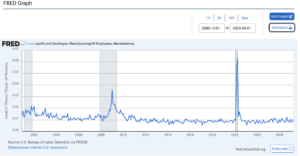Here’s a letter to the Washington Post.
Editor:
Kathleen Parker eloquently reminds us of the wisdom of Hannah Arendt (“This writer warned us about tyranny years ago. Will we listen now?” June 14). But in her attempt to explain the rise of Trump, Ms. Parker errs by repeating the popular refrain that Trump’s political success owes much to “Americans who felt disenfranchised by globalization.” Fact is, globalization caused no such ‘disenfranchisement,’ if by that is meant (as it almost always does) a surge in manufacturing-job losses.
From 1958 through 1980, the average monthly rate of manufacturing layoffs was 1.6 percent.* In contrast, from December 2000 through today (April 2025) – but excluding the Great Recession and the pandemic – that rate, despite China joining the WTO in 2001, was only 1.1 percent.**
While I can find no good estimate of the rate of manufacturing layoffs from 1981 through 2000, the data for these years on the decline in manufacturing employment as a share of total nonfarm employment reveal no significant quickening in the rate of manufacturing-job loss. From 1958 through 1980 the average monthly decline in manufacturing jobs as a share of total nonfarm jobs was 0.13 percent; from 1981 through 2000 this rate was 0.19 percent – higher, yes, than in 1958-1980, but only by six one-hundreds of a percent. And then from 2001 through today, this rate slowed slightly, to 0.16 percent.
Along with the fact that real hourly wages have risen steadily since the end of WWII, these data belie the notion that globalization over the past few decades sparked such a surge in manufacturing-job losses that ordinary Americans, in their desperation, embraced Trump’s protectionism. A far more credible explanation for today’s embrace of protectionism and its heralds isn’t what actually happened in the economy but, rather, what unfortunately happened, starting in the mid-1990s, in the pages of newspapers, magazines, books, and blogs – and on social media and in campaign speeches – namely, incessant repetition, from the left and the right, of the baseless claim that globalization “hollowed out” American industry and left ordinary workers impoverished. It did no such thing.
Globalization and the economy performed much more admirably than did pundits and politicians pontificating about globalization and the economy.
Sincerely,
Donald J. Boudreaux
Professor of Economics
and
Martha and Nelson Getchell Chair for the Study of Free Market Capitalism at the Mercatus Center
George Mason University
Fairfax, VA 22030* James F. Ragan, Jr., “Turnover in the Labor Market: A Study of Quit and Layoff Rates,” Economic Review, Federal Reserve Bank of Kansas City, May 1981, page 15, Table 1 (and asterisked footnote).
** Calculated by dividing “Layoffs and Discharges: Manufacturing” by “All Employees, Manufacturing.” (See attached screenshot.)




